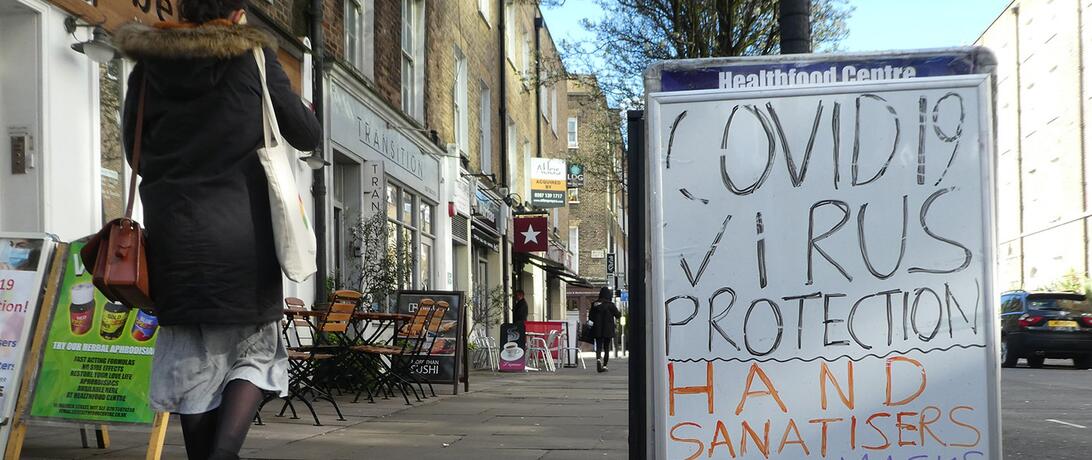
Finding some sense of normalcy doesn’t mean going back to traditional views of national security. It is time to formalize a new vision of how we view security.
The COVID-19 pandemic has changed the way most of us think about what it means to be safe.
As the United States begins to evaluate its role in this new world, it is critical that government leaders widen the definition of security from aircraft carriers and drones, and instead focus on human security. Human security means paying attention to the needs of individuals. Simply focusing on borders and cyberwars misses the more immediate motivations for insecurity and conflict: a lack of food, a lack of income, a loss of power.
The good news is that we have the opportunity--and the tools--to do better.
The Women, Peace and Security (WPS) agenda, specifically the Women, Peace, and Security Act of 2017, can help us rethink what security looks like for all Americans. Evidence from the past several decades shows that including women at all levels of decision-making results in more effective responses to newly emerging global threats, such as violent extremism, global warming, food insecurity, and pandemics. The well-being of women has become a primary indicator of the security of a country and therefore to setting US security priorities around the world.
We know from scholars like Valerie Hudson, that the way a State treats its women is correlated with how safe and secure it is. We also know that women are the first to see security challenges, but are routinely left behind in matters of war, peace and the economy. Coronavirus has also hit women harder. This isn’t just about women. We need to use a gender perspective to understand the impact of the Coronavirus. So far, the response has impacted women the most as they are the majority of essential frontline workers. Yet, there are more men dying from the virus than women. This means we must take into account the different ways that women and men, boys and girls are impacted by the pandemic and our response to it.
As we define the new normal, we must take the principles we promote for the world’s women and implement them here at home. Each and every relief and recovery effort in the US must include women’s voices and a gender perspective. If we want to truly be secure and competitive in the world, we must implement the WPS agenda.
We can start now.
Steps are already being taken to preserve data and documents for After Action Assessments to determine what went wrong and systemic opportunities to make changes for the future. These assessments are standard fare for the government at all levels, and given the nationwide impact of COVID-19, this means hundreds of reports will be produced. Furthermore, After Action Reports typically take into account at-risk communities. In the case of the pandemic, sex-disaggregated surveys and polling may yield important preparedness data as well as inform recovery in a more responsible way.
We simply can’t recover and do better next time by limiting our data collection to death-toll numbers and the Dow Jones. After Action Reports capture how survivors navigate a crisis. For example, in the past, this has led to adding diaper supplies in storm shelters and animal care plans for natural disasters where they formerly did not exist. In order to do this, we must ask questions about the differences in the experiences of male or female heads-of-households. For example, did women bear a disproportionate amount of the burden in “unpaid work” as the crisis unfolded? Did women-owned small businesses get their fair share of economic relief funding?
The Department of Homeland Security can take the lead in helping state, local, and tribal leaders by developing a strategy for ensuring a gender perspective in the After Action process as well as training and briefings of how this can create stronger data and recommendations that can save lives moving forward. This is not extra work. It’s actually mandated by Congress through the Women, Peace and Security Act.
We know from global development efforts that it is necessary to provide funds to support local women’s organizations implementing relief and recovery efforts to build community resilience. We also know that providing additional relief for women for things like affordable childcare, targeted business loans, and expanded paid parental leave and sick leave, particularly for low-wage workers, will also help to stabilize the economy and communities.
Failing to address these issues without attention to gender equality will lead to an uneven recovery and the overall response for the US economy will be slower and more costly.
In order to recover as a stronger nation, we need to ask what it really means for all Americans to ‘feel safe.’ The pandemic has shattered our archaic concepts of national security. While guns, fighter planes, battleships, and the number of troops under arms may successfully project ‘lethality’ to the outside world, they can’t protect us from threats like the pandemic. It is time to formalize a new vision of how we view security.
Article Details
Published
Topic
Program
Content Type
Opinion & Insights